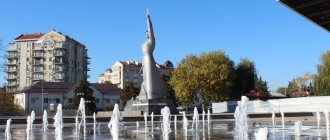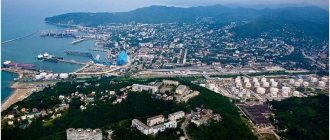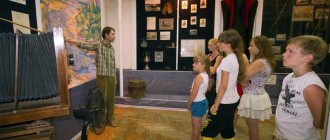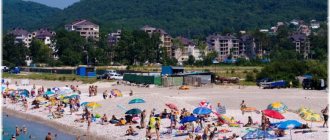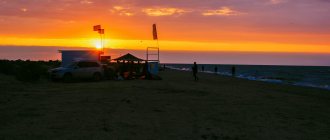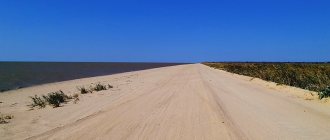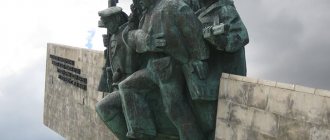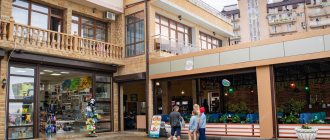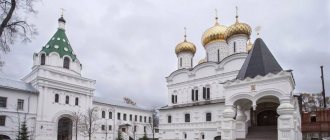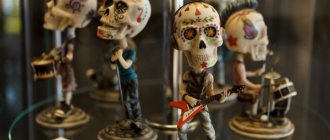The Krasnodar Territory is one of the three most densely populated regions of the country with an indicator of 5,647,652 people. And if we consider that the first two positions are occupied by St. Petersburg and Moscow, it can be called the largest region of Russia. At the same time, the All-Russian granary and the main destination for beach holidays cannot boast of a large area. The size of the territory is only 75,485 km², which puts the region in 41st place in the national ranking between the Nizhny Novgorod region and the Republic of Kalmykia. Because of this, there is a high level of density - 74.81 people/km²: eighth place among all subjects of the Russian Federation.
What holiday is it today?
09 February 2022, Wednesday
Today are holidays and events: Aeroflot's birthday International Dentist Day Memorable date in Russian military history: The feat of the cruiser Varyag Tomorrow: Diplomat's Day
Today is an Orthodox holiday: Transfer of the relics of St. John Chrysostom, Archbishop of Constantinople... Tomorrow: St. Ephraim the Syrian. Venerable Ephraim of Novotorzhsky. Venerable Ephraim of Pechersk, Bishop of Pereyaslavl. Venerable Theodosius of Totem, the head and founder of the Spasosumorin monastery...
Today is a national holiday: Chrysostom's Fire... Tomorrow: Ephraim's Day...
Seasons
Seasons, four periods of the year (spring, summer, autumn and winter) characterized by certain average temperatures. The period during which the Sun passes through one of these sectors is called the season. Spring in the Northern Hemisphere and autumn in the Southern Hemisphere begin when the Sun passes through the initial circle of declination and its right ascension is 0° (vernal equinox). Summer in the Northern Hemisphere and winter in the Southern Hemisphere occur when the sun's right ascension is 90° (summer solstice). Autumn in the Northern Hemisphere and spring in the Southern Hemisphere begin when the sun's right ascension is 180° (autumnal equinox). The beginning of winter in the Northern Hemisphere and summer in the Southern Hemisphere is considered to be the winter solstice, when the direct ascension of the Sun is 270°... Next: Seasons. Russian folk calendar. Monthly words...
Areas located in the mountains
In addition to a beach holiday, lovers of mountain hiking will also find a lot of interesting things to do in the Krasnodar Territory.
Any time of year is suitable for visiting mountainous areas. In winter, ski resorts begin to operate. The region has a good infrastructure for skiing: slopes are equipped, lifts are installed, equipment rental is organized, and special bases are built. You can choose a slope that suits your skill level. Hotels have been built for accommodation. In other periods, mountainous areas await hikers. In summer, mountaineering routes and mountain rafting are open here for extreme sports enthusiasts. Hiking and horseback riding routes are also available for those who prefer a quiet, contemplative holiday. It is worth mentioning the wonderful hunting and fishing in these places. A visit to the mountains will give you an experience of a lifetime!
Climbers should pay attention to the Otradnensky district. Here is the Drum Rock, which is very suitable for training climbs. For those who like simple mountain hikes, we can recommend the mountains of the Seversky region. The local trails are quite steep and climbing will require some effort, but this is still not mountaineering. From the top, by the way, there is a beautiful view of the surrounding area.
Folk calendar about every day
Every day one season always replaces another and this determines a person’s way of life. In connection with this, a folk calendar was formed in which there were practically no nameless, unmarked days. Every day was special, had its own purpose. All this was determined by climate conditions and astrological phenomena.
A calendar is a system for counting periods of time. The first calendars arose a long time ago, in ancient times, because there was a need to measure time. The word calendar comes from the Latin words caleo - to proclaim and calendarium - debt book. This is due to the fact that in Ancient Rome the beginning of each month was especially proclaimed, and because it was customary to pay debts on the first day of the month. Different peoples counted time differently. Some calendars are based on the changing phases of the moon - lunar calendars; in others - the change of seasons - sunny; in others, the length of the year was coordinated with the change of seasons, and the counting of months was associated with the phases of the Moon. Such calendars are called lunisolar.
In Rus', the calendar was called a monthly calendar. Every day, the month book covered the entire year of peasant life, “describing” day by day, month after month, where each day had its own holidays or weekdays, customs and superstitions, traditions and rituals, natural signs and phenomena. The cyclical nature of the calendar is reminiscent of human life, where spring is youth, summer is heyday, autumn is the time of harvesting fruits (it’s good if there are some, otherwise you can live your life without collecting fruits), winter is the time of wisdom and peace. This cyclicality and rhythm determined the way of life of the farmer. The folk calendar was an agricultural calendar, which was reflected in the names of the months, folk signs, rituals and customs. Even the determination of the timing and duration of the seasons is associated with real climatic conditions. Hence the discrepancy between the names of the months in different areas... Next: Folk calendar...
Fishing calendar for every day
The fishing calendar should not be taken as an absolutely indisputable truth. Fish biting is greatly influenced by a whole range of natural factors, as well as the influence on the nature of man himself. You must not forget that the fish’s bite depends and is determined not only by the calendar dates and biological cycles of their life, reflected in the calendar, but also, no less, by the state of their habitat; the bite also depends on weather conditions: air and water temperatures, cloudiness, wind direction and strength, etc... Next: Fishing calendar...
Content
- 1 Millionaire cities with more than 1 million people 1.1 Krasnodar
- 2.1 Sochi
- 3.1 Armavir
- 4.1 Abinsk
Orthodox calendar about every day
Orthodox calendar: Orthodox, Church and Christian holidays.
The church year is an alternation of weekdays and holidays. On weekdays, a person is called to work “by the sweat of his brow to earn his bread.” Holidays are given in order to feel liberation, to rise above the bustle and routine of the world, to feel involved in the highest of worlds, “where there are no illnesses, sorrows and sighs, but endless life.” Since ancient times, holiday cycles have been associated with the seasons. The pagans associated them with the worship of the forces of nature, the cult of which in the Old Testament was replaced by gratitude to the Creator for the universe. And although the connection between holidays and the seasons has not completely lost its power, since God is present in everything, in the plant and animal world, in human works, it nevertheless faded into the background, giving way to a spiritual foundation built on the Sacred Scriptures. The history of Orthodox holidays dates back to the times of the Old Testament. Each of the Orthodox holidays is dedicated to the remembrance of the most important events in the life of Jesus Christ and the Mother of God, as well as the memory of saints... Next: Orthodox calendar...
Medium-sized cities 20-100 thousand people
Abinsk
Population 37,415 people (2016).
Anapa
Population 73,410 people (2016). Resort city on the Black Sea. Specializes in children's recreation.
Apsheronsk
Population 40,349 people (2016).
Belorechensk
Population 52,153 people (2016).
Gelendzhik
Population 72,030 people (2016). Resort city on the Black Sea.
Hot key
Population 35,805 people (2016). Resort town on thermal mineral waters.
Gulkevichi
Population 34,289 people (2016).
Yeysk
Population 85,192 people (2016). A port on the Sea of Azov, a resort town with beaches and healing mud, popular for windsurfing. The city is home to an extra-curricular joint airfield (military and civilian), on the basis of which the most important military training center for naval aviation is located, which also includes one of the two NITKA simulators available in the country for training carrier-based aircraft carriers.
Korenovsk
Population 41,876 people (2016).
Kropotkin
Population 79,664 people (2016).
Krymsk
Population 57,184 people (2016).
Kurganinsk
Population 49,006 people (2016).
Labinsk
Population 60,665 people (2016).
Novokubansk
Population 35,440 people (2016).
Primorsko-Akhtarsk
Population 31,987 people (2016).
Slavyansk-on-Kuban
Population 65,812 people (2016).
Temryuk
Population 39,646 people (2016). The largest settlement on the Taman Peninsula. Seaport on the Sea of Azov. Known for its mud volcanoes.
Timashevsk
Population 52,581 people (2016).
Tikhoretsk
Population 59,297 people (2016).
Tuapse
Population 63,058 people (2016). Large port on the Black Sea.
Ust-Labinsk
Population 41,729 people (2016).
Khadyzhensk
Population 22,733 people (2016). Resort on mineral waters.
Russian folk calendar for every day
The word “sign” comes from the word “notice”, i.e. observe. As a result of observing what happens around a person every day, he accumulates life experience. This knowledge was passed down from generation to generation, carefully preserved and people trusted it as a sacred book. Many signs have come to us from the depths of centuries without losing their knowledge. Each of us is free to choose: to dismiss all this as an absurd superstition or to take a closer look at the signs and take the centuries-old experience of generations more seriously. Most of us, when taking exams, ask them to scold them, boasting about some kind of good fortune or luck, spit so as not to jinx them or knock on wood, take a detour if a black cat crossed the road, are afraid of the number 13 and much more. And who among us does not have lucky things, numbers? Who has never resorted to the help of fate at least once in their life, who has not believed in secrets? It’s as if everything connected with signs is hidden somewhere deep in our subconscious. Often we remember them mechanically, unconsciously, or just as a joke. But, undoubtedly, the signs contain a lot of accurate knowledge and practical wisdom of our ancestors. They cover all the characteristic, often difficult to perceive, natural phenomena. Signs have preserved a lot of what was in old folk holidays and customs; they help predict the weather, grow crops... Next: Folk signs...
Holiday calendar, dates and events of the year
All state and professional holidays in Russia, including significant World and International holidays, and other equally interesting holidays and events about every day.
The holiday has always kept pace with the history of mankind. Social time can be divided into three types: everyday life (weekdays), weekends and holidays. Everyday life is a series of practices repeated day after day and every day (work). Weekends are regular breaks from the rush of everyday life. It is believed that on weekends a person should restore his strength after working days. Day off, non-working day. A holiday is a day of celebration established in honor or in memory of someone or something. A day or series of days celebrated by the church in memory of a religious event or saint... Next: Calendar...
Migration
Every year hundreds to thousands of people migrate to the Krasnodar region from the northern part and central Russia. Hoping to get a better and easier life. True, the land on the territory is fertile; cherry plums and apples, plums and pears grow at every step. Residents of Georgia, Abkhazia, and Ossetia also migrate to the Krasnodar Territory. Population growth during the period of an imaginary coronavirus infection stopped due to a ban on exit and entry.
From January to April, 21,900 people managed to move into the Krasnodar Territory. More than half came from the CIS countries (Ukrainians). The indigenous population mainly moves to Greece, Abkhazia and Germany. Kuban is a production center for growing wheat.
Prayer book, Orthodox prayers for every day
Prayer is the most powerful means for healing all illnesses - both physical and mental. Prayers can be laudatory or grateful, petitionary and repentant. If we have offended God, sinned, we must ask Him for forgiveness, that is, repent. Such prayers are called repentant prayers. If everything is fine with us, if we and our loved ones are healthy and prosperous, if we have a place to live, something to wear, something to eat, we must glorify and thank God for this. Such prayers are called praise or thanksgiving. If some misfortune, illness, trouble or need happens, you need to ask God for help. Such prayers are called petitionary... Next: Orthodox prayers...
Zodiac, astrological, eastern calendar. Zodiac signs
In ancient times, to establish the calendar, priests used knowledge of the positions of all the planets. Before the reform of Peter 1, the New Year was celebrated on the Day of the Autumn Equinox. On this day, according to ancient legend, the most peaceful treaty was concluded between the Great Race (ancient Slavs) and the Great Dragon (ancient Chinese) and it was approximately 7518 years ago... For the ancient Slavs, the calendar month corresponded to the lunar cycle from new moon to new moon, taking into account such Thus, the relationship of the entire annual cycle with astronomical and natural phenomena. There was no coherent calendar system. The main natural phenomena are still considered to this day to be the days of the solar equinox and solstice - the Slavic holidays Maslenitsa, Kupala, Ovsen and Kolyada. But during the time of Peter 1, all ancient Slavic calendars were abolished and a new Western European calendar from the Nativity of Christ (Julian calendar) was introduced, while the beginning of the calendar was moved to January 1. The Julian calendar (old style) did not take leap days into account and accumulated one extra day every 128 years. After the October Revolution in 1918, the Gregorian calendar (new style) was introduced in Russia, according to which an amendment of 13 days was introduced. The calendar of the ancient Slavs was based on two planets: the Sun and the Moon. And now they don’t use anything at all. The calendar has become static. There is no such thing as the calendar, it turns out, resting on some planet. Nobody even knows about it. There are just some standard numbers, there are months and holidays. The calendar is based on the Sun and Moon. Why is this so? Because these two luminaries influence the Earth. The Earth revolves around the Sun, and the Moon revolves around the Earth. And these two luminaries create the atmosphere on the planet. From here the calendar is built... Next: Astrological calendar...
Dream books online, interpretation of dreams
A dream book is nothing more than an interpreter of dreams and dreams, a translator of dreams. Since ancient times, people have been using dream books; dreams have always been given great importance, and people have often noticed the prophetic properties of some dreams. The dream book can become your faithful assistant every day and throughout your life, thanks to the dream interpreter you can always make the right decisions, the dream book will help you resist temptations in time, and will warn you against wrong steps and frivolous actions. Further…
Ethnic composition
The main national composition is Russian - 4,522,962, in total, 124 ethnic groups live on the territory of Kuban: Armenians - 281,600, Ukrainians - 83,800, Tatars - 24,900, Greeks - 22,600, Georgians - 17,900, Belarusians - 16,900. Georgia has one border with the region and is washed by Black Sea. The site is occupied by Ossetians and Koreans, Lezgins and Uzbeks, Chuvash and Chechens, Abkhazians and Kabardians.
